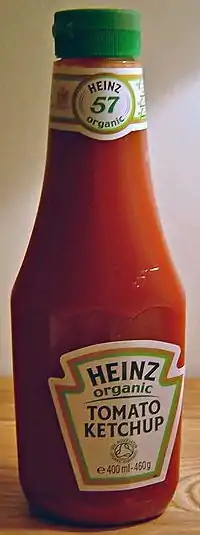ketchup
English


Etymology
1711, following earlier catchup (1690), of disputed origin.[1] Originally referred to a sauce from South/Southeast/East Asia – 1690: East Indies (region generally); 1711: Tonkin (northern Vietnam) and China.
Most likely from Malay kicap, from Min Nan Chinese 鮭汁 (kê-chiap, “brine of fish (namely salmon)”), though precise path is unclear – there are related words in various Chinese dialects, and it may have entered English directly from Chinese. Cognate to Indonesian kecap, ketjap (“soy sauce”). Various other theories exist – see Ketchup: Terminology for extended discussion.
Catsup (earlier catchup) is an alternative Anglicization, still in use in the U.S.
Pronunciation
- IPA(key): /ˈkɛtʃ.əp/, /ˈkɛtʃ.ʌp/
Audio (US) (file) Audio (Canada) (file)
Noun
ketchup (countable and uncountable, plural ketchups)
Usage notes
The term is now used almost exclusively to refer to tomato ketchup. However, at one time it was a more general term for sauce, and it is still occasionally used in this way, as with grape ketchup and mushroom ketchup.
The spelling ketchup became significantly preferred in the United States due to the popularity of the Heinz brand, which shortly after its introduction in 1876 switched from catsup to this spelling to distinguish itself from competitors. Other major brands, such as Hunt, subsequently followed, with Del Monte only switching to ketchup in 1988.[2]
This condiment is more commonly and somewhat ambiguously called tomato sauce outside of the Americas. In South Africa, the word ketchup is not generally understood.
Descendants
- → Cantonese: 茄汁 (ke4-2 zap1)
- → Catalan: quètxup
- → Czech: kečup
- → Dutch: ketchup
- → Finnish: ketsuppi
- → French: ketchup
- → German: Ketchup
- → Lower Sorbian: ketšup
- → Irish: citseap
- → Japanese: ケチャップ (kechappu)
- → Korean: 케첩 (kecheop)
- → Polish: keczup, ketchup
- → Russian: кетчуп (ketčup)
- → Armenian: կետչուպ (ketčʿup)
Translations
|
|
Verb
ketchup (third-person singular simple present ketchups, present participle ketchupping, simple past and past participle ketchupped)
- (transitive) To cover with ketchup.
- 1867, John Maddison Morton, Aunt Charlotte's maid: a farce in one act
- It strikes me she's "ketchupped" the lot! I won't touch a morsel!
- 1973, Horizon (page 15)
- "Well," said Chuck, ketchupping his hamburger, "I'd rather do without King Lear than put up with the human agony it sprang out of. I'd rather not have the Eroica than have the big bloody conqueror it tries to immortalize."
- 2009, David Silverman, Twinkle (page 4)
- Their fellow diners, like their ketchupped grub, were appropriately dashed and splattered with paint and plaster, reading their Suns and Daily Mirror.
- 1867, John Maddison Morton, Aunt Charlotte's maid: a farce in one act
References
- “The etymological origin of the word ketchup is a matter of confusion.” Pure Ketchup, by Andrew F. Smith, →ISBN. Page 4.
- “Is There a Difference Between Ketchup and Catsup?”, Slate, Aisha Harris, April 22, 2013
- “ketchup” in Douglas Harper, Online Etymology Dictionary, 2001–2019.
Dutch
Pronunciation
Audio (file)
Synonyms
French
Pronunciation
- (France) IPA(key): /kɛt.ʃœp/
Audio (France) (file) - (France, Quebec) IPA(key): /kɛt.ʃɔp/
Audio (Quebec) (file)
Further reading
- “ketchup” in le Trésor de la langue française informatisé (The Digitized Treasury of the French Language).
Polish
Alternative forms
Pronunciation
- IPA(key): /ˈkɛ.t͡ʂup/, (rare) /ˈkɛ.t͡ʂap/
Portuguese
Quotations
For quotations of use of this term, see Citations:ketchup.
Serbo-Croatian
Spanish
Alternative forms
Pronunciation
- IPA(key): /keˈt͡ʃub/, [keˈt͡ʃuβ]